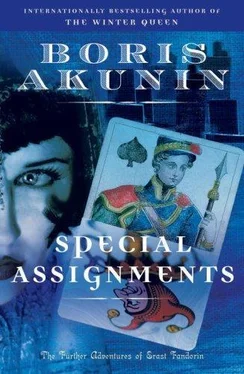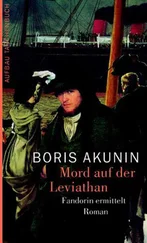The door squeaked again and Mimi said quickly: 'Pussy cat, don't throw anything. A man's brought what you told him to.'
Momos roused himself. 'Who? Sliunkov?'
'I don't know; he's repulsive, hair slicked over a bald patch. The one you cleaned out at whist at Christmas.'
'Send him in!'
The first thing Momos always did when he was preparing to conquer new territory was acquire a few useful people. It was like going hunting. When you came to a rich hunting ground, you took a look around, checked the forest paths, spied out convenient hidey-holes, studied the habits of the game; and in Moscow Momos had his own informants in various key positions. Take this Sliunkov, for instance: a man with a lowly position, a clerk from the secret section of the Governor's chancellery, but he could be so useful. He'd come in handy in that business with the Englishman, and he was just what was needed now. Reeling in the clerk couldn't possibly have been any easier: Sliunkov had lost three and a half thousand at cards and now he was bending over backwards to get his IOUs back.
The man who came in had sleeked-down hair and flat feet, with a document folder under his arm. He spoke in a half-whisper, constantly glancing round at the door: Antoine Bonifatievich' - he knew Momos as a French citizen - 'in the name of Christ the Lord, this is a hard-labour offence. Be quick, don't ruin me. I'm shaking in my shoes.'
Momos pointed without speaking: Put the folder on the desk, his gesture said. Then he waved his hand, still without speaking: Now wait outside the door.
The folder bore the following heading:
Deputy for Special Assignments
ERAST PETROVICH FANDORIN
At the top left there was a stamp:
Office of the
Governor-General of Moscow. Secret records
And then, written by hand: 'Top secret'. There was a list of documents pasted inside the cardboard cover:
Service record Confidential references Personal information
Well now, let's take a look at this Fandorin who's appeared to taunt us.
Half an hour later the clerk left on tiptoe with the secret file and a cancelled IOU for five hundred roubles. For a good turn like that, Momos could have handed back all his IOUs, but he might still come in useful again.
Momos strolled thoughtfully round the study, toying absent-mindedly with the tassel of his dressing gown. So that was him: an unmasker of conspiracies and master of secret investigations? He had more orders and medals than a bottle of champagne. A Knight of the Japanese Orders of the Chrysathemums - that was remarkable. And he'd distinguished himself in Turkey, and Japan, and travelled on special assignments to Europe. Yes indeed, a serious gentleman.
What had it said there in the references? - 'Exceptional abilities in the conduct of delicate and secret matters, especially those requiring skills of investigative deduction.' Hmm. He would like to know how the gentleman had deduced the nature of the lottery on the very first day.
Well never mind, my scary Japanese wolf; it still remains to be seen whose tail will end up in the trap, Momos warned his invisible opponent. But he shouldn't put his entire trust in official documents, no matter how secret they might be. The information on Mr Fandorin needed to be supplemented and 'fleshed out'.
The fleshing-out of the information took three days. During that time Momos undertook the following actions.
Having transformed himself into a manservant looking for a position, he befriended Prokop Kuzmich, the yard-keeper of Fandorin's landlord at the estate. They took a drop of vodka together, with pickled mushrooms, and had a chat about this and that.
He visited Korsh's Theatre and observed the box where Fandorin was sitting with his lady-love, the fugitive wife of the St Petersburg Usher of the Chamber, Opraksin. He did not look at the stage, on which, as chance would have it, they were performing Mr Nikolaev's play Special Assignment, but only at the Court Counsellor and his current flame. He made excellent use of his Zeiss binoculars, which looked like opera glasses, but had a magnification factor of 10. The Countess was, of course, a perfect beauty, but not to Momos's taste. He knew her kind very well and preferred to admire their beauty from a distance.
Mimi also made her contribution. In the guise of a milliner, she made the acquaintance of the Countess's maid Natasha and sold her a new serge dress at a very good price. In the process they drank coffee with cakes, chatted about women's matters and gossiped a little.
By the end of the third day the plan of the counter-attack was ready. It would be subtle and elegant - exactly what was required.
The operation was set for Saturday, 15 February.
The military action unfolded precisely according to the planned dispositions. At a quarter to eleven in the morning, when the curtains were drawn back at the windows of the outhouse on Malaya Nikitskaya Street, a postman delivered an urgent telegram addressed to the Countess Opraksina.
Momos was sitting in a carriage diagonally across from the estate, keeping an eye on his watch. He noticed some kind of movement behind the windows of the outhouse and even thought he could hear a woman shouting. Thirty minutes after the delivery of the message, Mr Fandorin himself and the Countess hastily emerged from the house. Trotting along behind them, tying up her headscarf, came a ruddy-cheeked young woman -the aforementioned maid Natasha. Madame Opraksina was in a state of obvious agitation. The Court Counsellor was saying something to her, apparently trying to calm her down, but the Countess evidently did not wish to be calmed. But then, he could understand how Her Excellency must be feeling. The telegram that had been delivered read: 'Addy, I am arriving in Moscow on the eleven o'clock train and coming straight to you. Things cannot go on like this. You will either leave with me or I shall shoot myself before your very eyes. Yours, insane with grief, Tony'
According to information received from the maid, Madame Opraksina might have abandoned her legal spouse, the Privy Counsellor and Usher of the Chamber Count Anton Apollonovich Opraksin, but she still called him Tony. It was perfectly natural that Monsieur Fandorin would decide to spare the lady an unpleasant scene. And, of course, he would accompany her as she was evacuated, since Ariadna Arkadievna was highly strung and would need to be consoled at length.
When Fandorin's conspicuous sleigh with its cavern of fluffy American bearskin had disappeared round the corner, Momos unhurriedly finished his cigar, looked in the mirror to check that his disguise was in order and, at precisely twenty minutes past eleven, jumped out of the carriage. He was wearing the uniform of an usher of the chamber, complete with ribbon, star and sword, and a three-cornered hat with a plumage on his head. For a man who had come straight from the train, of course, it was a strange outfit, but it ought to impress the oriental servant. The important thing was to be swift and decisive - to give him no chance to gather his wits.
Momos walked through the gates with a determined stride, crossed the yard at a half-run and hammered loudly on the door of the wing, although he could see the bell clearly enough.
The door was opened by Fandorin's valet, a Japanese subject by the name of Masa, who was absolutely devoted to Fandorin. This information, and also the previous day's close study of Mr Goshkevich's book on Japanese manners and customs, had been of assistance to Momos in determining how he ought to comport himself
Aha, Monsieur Fandorin!' Momos roared at the slanty-eyed short-ass, rolling his eyes in a bloodthirsty manner. Abductor of other men's wives! Where is she? Where is my adored Addy? What have you done with her?'
Читать дальше











